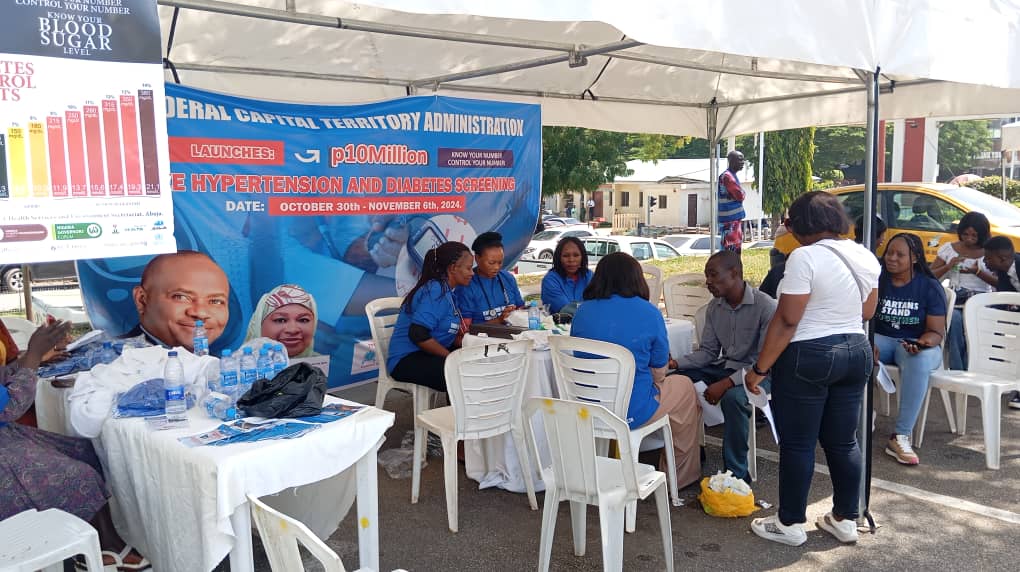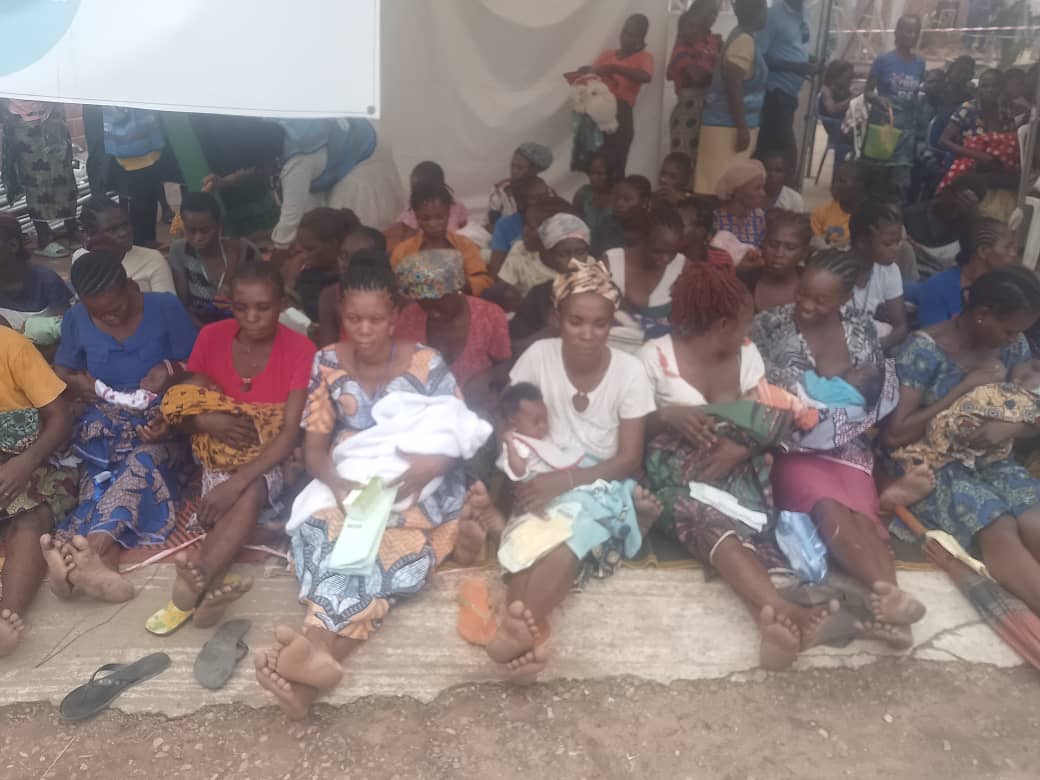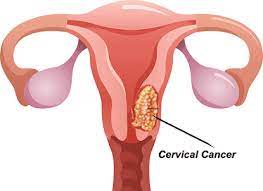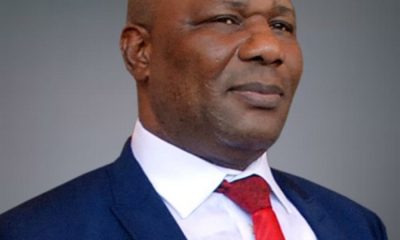Health
Health: FCTA kick off Screening of over 250,000 Abuja Residents

By Laide Akinboade, Abuja
The Federal Capital Territory Administration, FCTA, on Wednesday, kicked starts the screening of over 250,000 Abuja residents on diabetes and hypertension, and also do referrals.Dr Adedolapo Fasawe the Mandate secretary of Federal Capital Territory Health and Environmental Services Secretariat (FCT-HESS, while declaring the one week screening open, in Abuja.
She raised alarm at the rate at which people slump and die of high blood pressure and diabetes, adding that these unnecessary deaths can be prevented by regularly checking your sugar level and your blood pressure. She lamented that diabetes and hypertension are two silent killers and noted that, North central has one of the highest number of diabetes and hypertension. And 40% didn’t know they have hypertension until they came across a program like this.According to her, “So, this is an initiative of all commissioners for Health in Nigeria; 36 states plus the FCT. I am happy to say here in the FCT, we have had several programmes similar to this. We had a medical palliative program whereby we gave people medicines for free, for whatever their ailments is for one month. So that the money they would have used to buy medicines, they would use for other things. And we encourage the Health Insurance Scheme, whereby you pay a token, if you can afford it and your healthcare is free for the year. Or if you are considered vulnerable or poor, you are registered for free.”Now, what motivated this, we started noticing that people were slumping and dying. The rate of non-communicable diseases is going high. We were focusing a lot on HIV, malaria, and tuberculosis. But all of a sudden, people are dropping dead, and older people who were otherwise healthy in the morning would slump in the afternoon. At post-mortem, we were realising that people had undiagnosed heart diseases, which is a complication of undiagnosed hypertension. Hypertension is a very treatable disease if caught early. Diabetes is a very treatable disease if caught early. Treatable in the sense that if you adhere to your doctor’s instructions, and take your medication, you will live a normal life”.She continued, “Out of every 27 Nigerians, one person is hypertensive, this is recorded. Now, we are trying to look for all these people, educate them, and give them medication, so that your quality of life, your output at work, and in the end, the GDP of the nation would be improved. Because with this RHA, we constantly look for ways to reach the people and touch them. And the essence of this program also is that people find it hard to leave their workplace where they get money, their markets, and their farms, to go to the hospital to check. “We are taking this project 10 million to the doorstep of people, where they live, where they work, where they play. We will be in every Area council, we will be in most chiefdoms and palaces, we will be in markets, we will be in places like this where most people aggregate, and the good news is, it will run for one week. If you can’t make it today, you will make it tomorrow. And I believe at the end of this, the saying ‘health is wealth’ will truly be understood. Without good health, we cannot enjoy the beautiful infrastructure that the FCT is putting up daily”.”This program is not only for those who are suffering from hypertension or diabetes. It is also for people who we find their results to be normal. When we find their results to be normal, our screening tool has some questions; do you smoke? Do you exercise? What is your diet like, what is your lifestyle like? If the result is normal, we will encourage you and teach you how to keep it normal. That means you have been doing something good.”For people we have found to have normal readings, we encourage them and teach them how to keep it normal. They are also a very integral part of this program. It’s called health promotion. Prevention is better than cure. We can learn from them what they have been doing, we can teach them to teach their neighbours how to keep their blood pressure and blood sugar normal. And if indeed within this secretariat, we are finding normal readings, the risk factors for high blood pressure include stress, sleeplessness, obesity, family history, and sedentary lifestyle. What it then means is that most of us here, do not fall into that. If you work for Barrister Nyesom Wike, it is not likely that you have a sedentary lifestyle”.The Acting Director of the FCT Health Insurance Scheme, Dr Salma Lawal Belgore also announced that the FCT will undertake the cost of health services for a pregnant woman, Mrs Esther Omojo, until a year after the birth of her baby. She explained that the insurance will cover medical consultations, drugs, delivery and even surgery.“Our patient will benefit from medical consultation, lab investigations, her drugs, her delivery and even if she has to have surgery, it is all covered by the health insurance scheme, at no cost to her. The FCT Administration is enrolling her under the health insurance scheme, as well as all FCT residents. With the unborn baby, and a year after the baby is born, the baby is also going to be covered under the health insurance scheme, and will access medicines, medical consultations, and lab investigations at no cost to the mother or the baby”, she said.Health
World Breastfeeding Week: Benue Yet to Meet National Goal, Global Target of Breastfeeding – UNICEF

World Breastfeeding Week: Benue Yet to Meet National Goal, Global Target of Breastfeeding – UNICEF
From Attah Ede, Makurdi
The United Nations Children’s Fund, (UNICEF) in Benue State, on Friday lamented that the state is yet to meet national goal and global target for breastfeeding and new mothers, saying only one of every two newborns representing 47% are breastfed within the first hour of life in the State.
It further said only one of two children representing 56.
7%, is exclusively breastfed for six months while only 37.6% of children are breastfed up to two years in the State, falling below the national goal of 65% and the global target of 60% by 2025.The UNICEF Chief of Field Office, Enugu, Mrs.Juliet Chiluwe disclosed this during the flag off of the 2025 World Breastfeeding Week at the Benue State University Teaching Hospital (BSUTH) Makurdi and the Ultra-modern International Market (Yelewata) IDP camp.
Mrs. Chiluwe enjoined relevant stakeholders to put mothers and babies first by prioritizing breastfeeding and building sustainable support systems for every mother and child in Nigeria.
She maintained that supporting new mothers to breastfeed exclusively for at least six months is the best method of child nutrition in these critical times, stressing that the method is sustainable, cost-effective, and zero-waste as it does involve packaging, no pollution, but just pure nourishment from mother to child—even in emergencies.
The Chief of Field Office who also congratulated all the mothers in the State, and across the country for breastfeeding their babies, intimated that over 90% of Nigerian mothers breastfeed their babies and advocated that both public and private sectors to give compulsory maternity leave to new mothers and support them with six-month paid maternity leave.
“UNICEF, alongside the Government of Nigeria and our partners, is calling for bold, coordinated action to train every frontline health worker with hands-on breastfeeding support skills especially at birth. Let us invest in community health workers to deliver breastfeeding support where it matters most — at the home — we need to equip our hardworking community workers with the skills to address socio-cultural barriers to exclusive breastfeeding like the practice of giving water to a child under six months .
“As enshrined in the Convention on the Elimination of all forms of Discrimination Against Women, let us walk the talk and make six months paid maternity leave a reality – not just in policy but in practice. In addition, let us make workplaces breastfeeding friendly — all we require is 10 square metres of space to create safe and hygienic lactation spaces, is that too much to ask”, Mrs. Chiluwe stated.
On his part, Chief Medical Director, Benue State University Teaching Hospital (BSUTH), Dr. Stephen Hwande, thanked UNICEF for coming to launch this year’s World Breastfeeding Week at the Teaching Hospital to encourage health workers and encourage them to support every child who is born to be put to the breast immediately.
He disclosed that birth rates at the BSUTH has astronomically increased from 20 to 200 per month as a result of moderate child delivery fee which now stance at N5,000 only.
Dr. Hwande explained that apart from reducing the child delivery fee to an affordable rate, the University Teaching Hospital has opened a Center for children with special needs especially for those children who are unable to do certain things between six to nine months of birth where they can be treated.
“We now have established a therapeutic centre for children with special needs and developmental disorders such as autism, hearing disorder, inability to stand or walk at the right, to turn neck etc”, he said .
The CMD therefore called on new mothers to prioritise breastfeeding of their children, adding investments in breast milk will make their shape, intelligent and enhance their well being.
In her goodwill message, the Executive Secretary, Benue State Primary Healthcare Board, Mrs. Grace Wende, said the theme for 2025 “Prioritze Breastfeeding: Creating Sustainable Support Systems,” resonates deeply with relevant stakeholders commitment to promoting the health and well-being of the Benue populace especially mothers and children.
She insisted that every mother must have access to the support and information she needs to breastfeed as long as she wishes to do so – by investing in skilled breastfeeding counselling, enforcing the International Code of Marketing of Breast-milk Substitutes, and creating environments—at home, in healthcare, and at work—that support and empower women.
According to her, breastfeeding has been linked to improved cognitive development and higher IQ scores and has been shown to reduce the risk of respiratory tract infections, ear infections, and other diseases as well as helps the uterus contract back to its pre-pregnancy size, reducing bleeding and promoting healing.
The director of medical services state ministry of health, Dr. Joshua Agbadu and mother club focal point, Nigeria Red Cross,Hemba Agatha, all commended UNICEF for their numerous intervention particularly in the area of health in the State and promised to support activities that will enhance breastfeeding amongst nursing mothers in the State.
From Attah Ede, Makurdi
The United Nations Children’s Fund, (UNICEF) in Benue State, on Friday lamented that the state is yet to meet national goal and global target for breastfeeding and new mothers, saying only one of every two newborns representing 47% are breastfed within the first hour of life in the State.
It further said only one of two children representing 56.7%, is exclusively breastfed for six months while only 37.6% of children are breastfed up to two years in the State, falling below the national goal of 65% and the global target of 60% by 2025.
The UNICEF Chief of Field Office, Enugu, Mrs.Juliet Chiluwe disclosed this during the flag off of the 2025 World Breastfeeding Week at the Benue State University Teaching Hospital (BSUTH) Makurdi and the Ultra-modern International Market (Yelewata) IDP camp.
Mrs. Chiluwe enjoined relevant stakeholders to put mothers and babies first by prioritizing breastfeeding and building sustainable support systems for every mother and child in Nigeria.
She maintained that supporting new mothers to breastfeed exclusively for at least six months is the best method of child nutrition in these critical times, stressing that the method is sustainable, cost-effective, and zero-waste as it does involve packaging, no pollution, but just pure nourishment from mother to child—even in emergencies.
The Chief of Field Office who also congratulated all the mothers in the State, and across the country for breastfeeding their babies, intimated that over 90% of Nigerian mothers breastfeed their babies and advocated that both public and private sectors to give compulsory maternity leave to new mothers and support them with six-month paid maternity leave.
“UNICEF, alongside the Government of Nigeria and our partners, is calling for bold, coordinated action to train every frontline health worker with hands-on breastfeeding support skills especially at birth. Let us invest in community health workers to deliver breastfeeding support where it matters most — at the home — we need to equip our hardworking community workers with the skills to address socio-cultural barriers to exclusive breastfeeding like the practice of giving water to a child under six months .
“As enshrined in the Convention on the Elimination of all forms of Discrimination Against Women, let us walk the talk and make six months paid maternity leave a reality – not just in policy but in practice. In addition, let us make workplaces breastfeeding friendly — all we require is 10 square metres of space to create safe and hygienic lactation spaces, is that too much to ask”, Mrs. Chiluwe stated.
On his part, Chief Medical Director, Benue State University Teaching Hospital (BSUTH), Dr. Stephen Hwande, thanked UNICEF for coming to launch this year’s World Breastfeeding Week at the Teaching Hospital to encourage health workers and encourage them to support every child who is born to be put to the breast immediately.
He disclosed that birth rates at the BSUTH has astronomically increased from 20 to 200 per month as a result of moderate child delivery fee which now stance at N5,000 only.
Dr. Hwande explained that apart from reducing the child delivery fee to an affordable rate, the University Teaching Hospital has opened a Center for children with special needs especially for those children who are unable to do certain things between six to nine months of birth where they can be treated.
“We now have established a therapeutic centre for children with special needs and developmental disorders such as autism, hearing disorder, inability to stand or walk at the right, to turn neck etc”, he said .
The CMD therefore called on new mothers to prioritise breastfeeding of their children, adding investments in breast milk will make their shape, intelligent and enhance their well being.
In her goodwill message, the Executive Secretary, Benue State Primary Healthcare Board, Mrs. Grace Wende, said the theme for 2025 “Prioritze Breastfeeding: Creating Sustainable Support Systems,” resonates deeply with relevant stakeholders commitment to promoting the health and well-being of the Benue populace especially mothers and children.
She insisted that every mother must have access to the support and information she needs to breastfeed as long as she wishes to do so – by investing in skilled breastfeeding counselling, enforcing the International Code of Marketing of Breast-milk Substitutes, and creating environments—at home, in healthcare, and at work—that support and empower women.
According to her, breastfeeding has been linked to improved cognitive development and higher IQ scores and has been shown to reduce the risk of respiratory tract infections, ear infections, and other diseases as well as helps the uterus contract back to its pre-pregnancy size, reducing bleeding and promoting healing.
The director of medical services state ministry of health, Dr. Joshua Agbadu and mother club focal point, Nigeria Red Cross,Hemba Agatha, all commended UNICEF for their numerous intervention particularly in the area of health in the State and promised to support activities that will enhance breastfeeding amongst nursing mothers in the State.
Health
Experts Seek Unified Action against Cervical Cancer

Torough David, Abuja
Stakeholders across health sectors have called for urgent, coordinated investment in prevention, equitable HPV vaccine access and harmonized health data to accelerate progress towards elimination of cervical cancer across Africa.
They made the call on Wednesday, during a panel session with the Theme ”Accelerating Cervical Cancer Elimination in Nigeria, From Policy to Practice”.
Head of Division, Maternal, Newborn, Child and Adolescent Health, Africa CDC, Dr Fidele Ngabo Gaga, highlighted its efforts to harmonise and aggregate health data across all 55 African Union (AU) Member States.
“We are developing a continent-wide data-sharing agreement and centralised repository to support data upstreaming and policy development.
“The goal is to present unified data at AU Summits, helping countries make evidence-based decisions,” Gaga said:
Prof. Imran Morhason-Bello, a leading gynaecologic oncologist from the University College Hospital, Ibadan, made a compelling financial case for prioritising prevention over treatment.
“Screening just between 2023 and 2027 will cost Nigeria N351 billion.
“But treating 10,000 women with invasive cervical cancer from 2027 to 2030 could cost us N1.4 trillion. Prevention is not only more humane, it is far more cost-effective,” he said.
Morhason-Bello also addressed innovations such as self-sampling for HPV testing, already being implemented in Nigeria through implementation science.
“Women receive a self-sampling kit, return it the same day, and positive results are treated before noon.
“It is happening in markets and schools. It is not a pilot, it is real.
“We have even developed a mobile app (available in multiple languages and offline) to guide women through the self-sampling process, increasing accessibility in low-resource settings,” he said.
External Affairs Director for MSD, Sub-Saharan Africa, Vuyo Mjekula, addressed one of the most common myths around the HPV vaccine rollout.
“Let me be clear, there is no shortage of HPV vaccines. If anyone tells you otherwise, call me directly. The real issue is equity and strategic allocation,” she said.
Mjekula recalled early proposals that included boys in HPV vaccination efforts, but warned that without careful planning, some countries would be left out entirely.
She called for one national policy that ensures equitable access to vaccines and services, especially for the most vulnerable girls.
“This is not about science alone. A dose costing N125,000 may be affordable to some, but to a woman in a rural village, it is like N10 million.
“If she must choose between survival and feeding her children, the answer is obvious,” she said.
She applauded Nigeria’s progress, noting that since the national rollout, the number of vaccinated girls across the continent has more than doubled, driven primarily by Nigeria’s leadership.
Mjekula also made an appeal for multi-sectoral collaboration, urging the involvement of private sector giants, from banks to telecoms and philanthropic foundations.
“Health is not just the government’s responsibility. We need to imagine beyond the healthcare we can afford with public funds and work toward the healthcare we want as a society,” she said.
She also called for a business case for investment in HPV prevention and cancer control, saying the task force must work hand-in-hand with all stakeholders.
“Let us go far together. If you want to go quickly, go alone. But if you want to go far, go together,” she said.
The symposium concluded with a call to integrate cancer screening into primary health care services.
It also called for the deployment of cost-effective technologies like self-sampling, addressing myths around vaccine shortages, and ensuring gender-sensitive, data-informed policies.
As Nigeria and the continent advance towards achieving the WHO 90-70-90 cervical cancer elimination targets, the message from experts was clear: “Let us do big and let us do it together”.
Health
89% of Infants Vaccinated Globally in 2024, WHO, UNICEF Warn of Risks

The United Nations agencies have reported that in 2024, approximately 89 per cent of infants worldwide, about 115 million children, received at least one dose of the diphtheria, tetanus, and pertussis (DTP) vaccine.This update comes from new national immunisation coverage data released on July 14 by the World Health Organisation (WHO) and the United Nations Children’s Fund (UNICEF).
Compared to 2023, an additional 171,000 children received at least one vaccine dose, and one million more completed the full three-dose DTP series. While these gains are modest, they reflect ongoing global efforts to protect children in spite of rising challenges.However, nearly 20 million infants still missed at least one DTP vaccine dose in 2024, including 14.3 million “zero-dose” children who never received any vaccine.This figure exceeds the 2024 target by four million, putting global immunisation goals outlined in the Immunisation Agenda 2030 at risk.WHO Director-General Dr Tedros Ghebreyesus emphasised the life-saving power of vaccines, stating, “It’s encouraging to see an increase in children vaccinated, but we still have much work to do. “Cuts in aid and vaccine misinformation threaten to reverse decades of progress.”He highlighted factors contributing to under-vaccination, including limited healthcare access, supply disruptions, conflict, and misinformation.“Data from 195 countries show 131 have consistently reached at least 90 per cent coverage with the first DTP dose since 2019. Yet, progress is stalling in 47 countries, with 22 nations seeing declines after previously meeting this target.”Tedros warned that conflict and humanitarian crises significantly undermined vaccination efforts.“A quarter of the world’s infants live in 26 fragile or conflict-affected countries, which account for half of all unvaccinated children globally.“In these areas, unvaccinated children rose from 3.6 million in 2019 to 5.4 million in 2024, highlighting an urgent need for integrated immunisation in humanitarian responses.“Immunisation coverage in 57 low-income countries supported by Gavi, the Vaccine Alliance, improved in 2024, reducing the number of under-vaccinated children by about 650,000.“Yet, some upper-middle- and high-income countries face early signs of declining coverage, which increases the risk of disease outbreaks.”UNICEF Executive Director Catherine Russell welcomed the progress but warned millions of children remained vulnerable to preventable diseases.She called for urgent action to overcome barriers such as shrinking health budgets, fragile systems, misinformation, and conflict-related access issues.Russell noted encouraging expansions in vaccines against HPV, meningitis, pneumococcal disease, polio, and rotavirus.“Global HPV vaccine coverage among eligible adolescent girls rose from 17 per cent in 2019 to 31 per cent in 2024, although it remains far below the 90 per cent target set for 2030.”Gavi CEO Dr Sania Nishtar added that while lower-income countries protected more children than ever, population growth, fragility, and conflict continued to hamper equity in vaccination efforts.She highlighted improvements in measles coverage but cautioned that it still fell short of the 95 per cent threshold required to prevent outbreaks.“Measles outbreaks nearly doubled from 33 countries in 2022 to 60 in 2024.”Nishtar stressed that funding shortfalls, instability, and rising misinformation threaten to stall or reverse progress, risking increased deaths from vaccine-preventable diseases.WHO and UNICEF called on governments and partners to close funding gaps for Gavi’s 2026–2030 strategic cycle to protect millions of children.They also urged strengthening immunisation efforts in conflict-affected and fragile settings, and prioritising locally led strategies and increased domestic investment in primary healthcare systems.Additionally, the agencies emphasised the need to counter vaccine misinformation through evidence-based campaigns.They also called for greater investment in robust data collection and disease surveillance systems to guide effective immunisation programmes. (NAN)

















